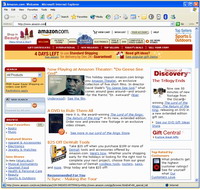Amazon.com launches digital music store without protection against copying
The launched much-anticipated digital music store with nearly 2.3 million songs is not protected against copying.

The store, Amazon MP3, lets shoppers buy and download individual songs or entire albums. The tracks can be copied to multiple computers, burned onto CDs and played on most types of PCs and portable devices, including Apple Inc.'s iPod and Microsoft Corp.'s Zune.
Songs cost 89 cents to 99 cents each and albums sell for $5.99 (4.25 EUR) to $9.99 (7.08 EUR).
Major music labels Universal Music Group and EMI Music have signed on to sell their tracks on Amazon, as have thousands of independent labels. The company said several smaller labels are selling their music without copy protection for the first time on the Amazon store, including Rounder Records and Trojan Records.
Amazon's store competes with Apple's market-leading iTunes, which is also offering some songs without so-called digital rights management technology, which prevents unauthorized copies from playing.
Although DRM helps stem illegal copying, it can frustrate consumers by limiting the type of device or number of computers on which they can listen to music. Copy-protected songs sold through iTunes generally won't play on devices other than the iPod, and iPods won't play DRM-enabled songs bought at rival music stores.
EMusic.com Inc., another popular download site, also sells tracks in the DRM-free MP3 format but, like Amazon's store, doesn't offer music from some major labels that still require anti-piracy locks.
Bill Carr, Amazon's vice president for digital music, said it will be up to customers to use the music they buy legally.
To help stop music piracy, Carr said some record labels add a digital watermark to MP3 files that indicate what company sold the song, and Amazon adds its own name and the item number of the song, for customer service purposes. He added that no details about the buyer or the transaction are added to the downloaded music file.
"By and large, most customers just want a great, legitimate way to buy the music they want," Carr said in an interview Tuesday morning. "What the vast majority of labels believe is that they will sell more music by giving customers what they want ... by enabling DRM-free MP3 - than by continuing to confuse customers or force them to choose methods that are not legal, because the legitimate alternatives are not good."
Carr characterized the number of record labels that still insist on copy-protection technology as "a handful." But David Card, an analyst at Jupiter Research, said in an interview that "having two out of four labels doesn't cut it."
Warner Music Group Corp. and Sony BMG Music Entertainment, which is owned by Sony Corp. and Bertelsmann AG, have not agreed to sell music on Amazon MP3, and Card pointed out that Universal and EMI have made only parts of their catalogs available without copy protection.
"Their catalog is going to suffer for a while," he said.
Card said Amazon's entrance into the market represents serious competition for Apple, which can no longer rely solely on the bond between the iPod and iTunes.
But, Card said: "In and of itself, (Amazon MP3) isn't enough to change any market share. They have to do a good job at building their store."
Colin Sebastian, a Lazard Capital Markets analyst, wrote in a note to investors Tuesday that he doesn't expect digital music sales to boost Amazon's profit, "given the significant contribution the company currently receives from traditional (physical) media sales, and the low margins typical with music download services, compounded by a highly competitive environment."
Subscribe to Pravda.Ru Telegram channel, Facebook, RSS!


